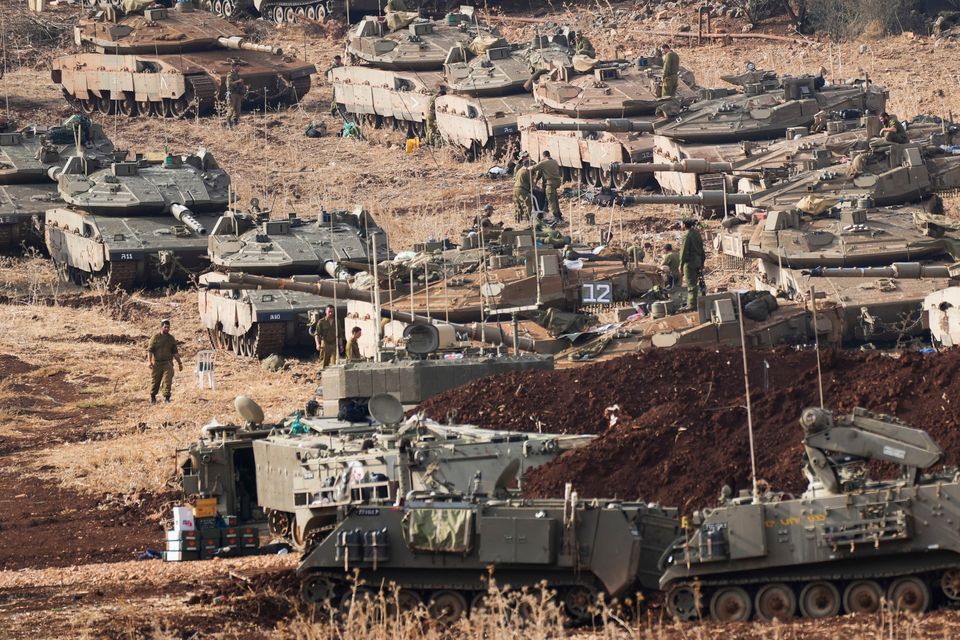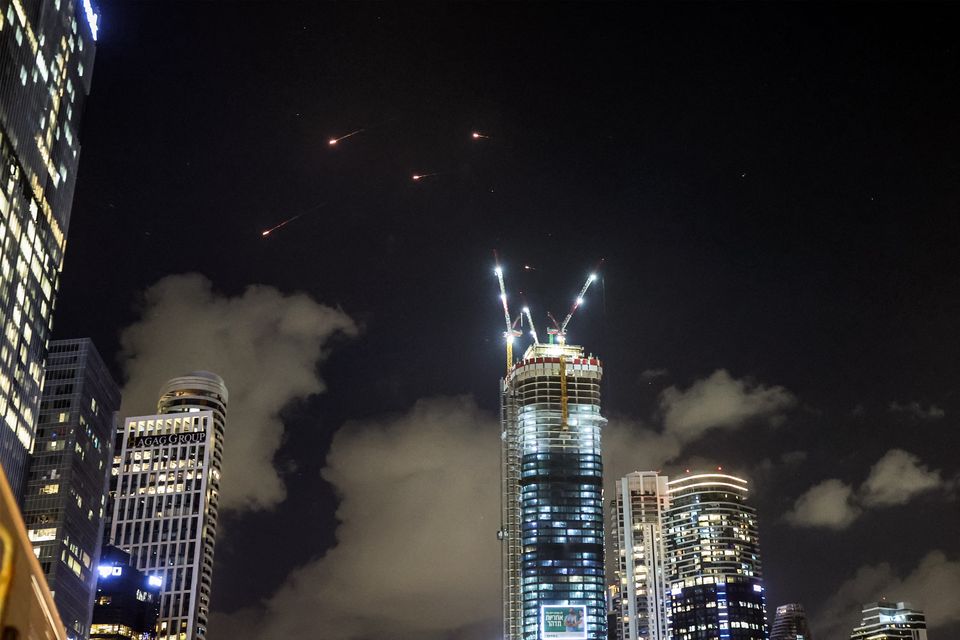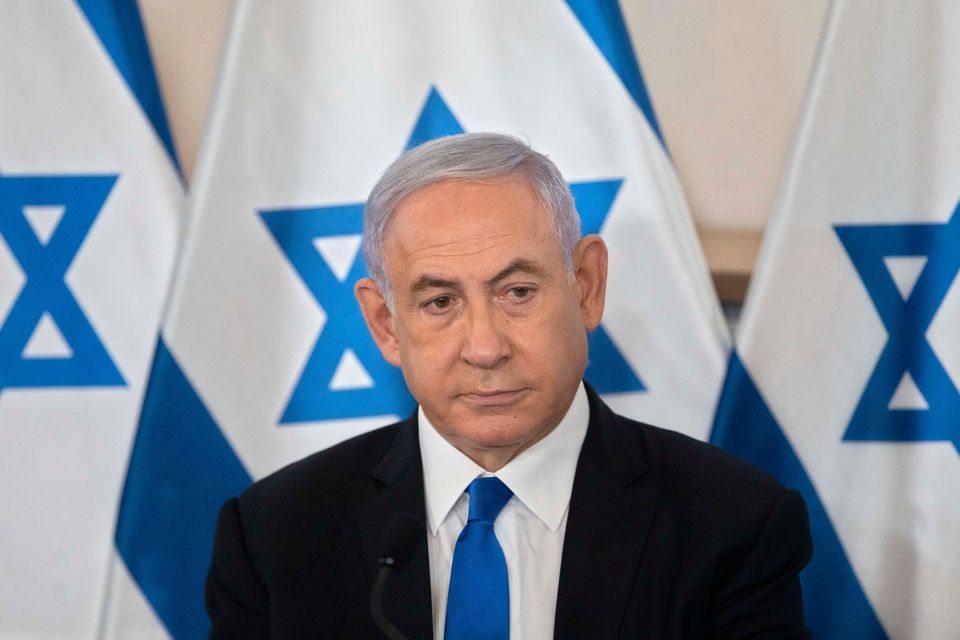Israel has invaded Lebanon in a major escalation of the conflict in the Middle east as Iran retaliated by firing hundreds of missiles at major cities across the country, forcing millions of Israelis into bomb shelters.
Hundreds of air defence missiles flashed over the cities of Tel Aviv, Ashdod and Jerusalem in an attempt to intercept the Iranian rockets as sirens sounded throughout the country. The Israeli military said the attacks were aimed at 10 million Israeli citizens.
Israeli police also said six people were killed in a shooting attack in Tel Aviv.
Israeli prime minister Benjamin Netanyahu was rushed into a security meeting in a secure bunker near Jerusalem as they worked up a response to the massive onslaught, officials said.
“The Israeli Air Forces (IAF) is doing and will continue to do everything necessary to protect the civilians of Israel,” the air force wrote on X, formerly Twitter. “We are prepared for both — defence and offense, at peak readiness.”
The Iranian military, known as the Islamic Revolutionary Guard Corps (IRGC), issued a statement claiming they had fired the volley of missiles in response to the assassinations of Hamas and Hezbollah leaders, Ismail Haniyeh and Hassan Nasrallah. “If [Israel] responds to the operation,” they warned, “it will face heavy actions”.
Israeli soldiers work on tanks at a staging area in northern Israel near the Israel-Lebanon border. Pic: AP
Footage coming from Israel showed women and children running into bomb shelters, with others shielding each other on the sides of roads.
Hezbollah had already fired at Tel Aviv earlier on Tuesday as senior White House officials warned that an Iranian attack was “imminent”. Those attacks caused limited damage but forced Israel to announce new restrictions on public gatherings and closed beaches, reducing the number of people that can meet to 30 outdoors and 300 indoors.
The Iranian attack ended a day of significant escalation as the Israeli military said it carried out “targeted” raids against dozens of Hezbollah positions in southern Lebanon, the area of the country controlled by the group, as part of what it described as the “next phase” of its war aimed at neutralising the Iran-backed group nearly a year after launching an attack in Gaza. Israel’s incursion into Lebanon is the first since the month-long all-out war with Hezbollah in 2006, and only the fourth time they have invaded their neighbour since Israel’s creation more than 75 years ago.
Columns of Israeli tanks and infantry fighting vehicles were seen positioned on its northern border on Tuesday as air strikes smashed into the hilly landscape of Lebanon’s southern region and the suburbs of Beirut.
Where in other times Hezbollah would have been all around the city offering assistance to the displaced, now every aspect of the party seems to have gone underground.
Read more
On Tuesday afternoon, new strikes hit a building in a residential neighbourhood of Beirut. Judy, a resident and shopkeeper in a Sunni neighbourhood of Beirut, said she was worried about the coming Israeli incursion and the situation in Beirut if the war continues.
“There is no security or stability in our lives. Every house and room is taken by families,” she said. “There is a huge pressure on everything, whether for food, drinks, and so on. It is much worse than before. Everyone is scared, the young and the old. What can we do to protect us if the army enters and occupies our land? There is nowhere to go. Only God can protect us.”
More than 1,000 people in Lebanon, from the south-western city of Tyre, up to the capital of Beirut further north and across the country in the Bekaa valley, have already been killed during a fortnight of Israeli air strikes that ultimately presaged their invasion. More than a million citizens have also been displaced as they fled the inbound Israeli troops.
Israeli military spokespeople said the attacks were limited to within only a few miles inside Lebanon and would not involve an assault on Beirut, though at least four additional brigades were mobilised to the north ahead of future cross-border incursions.
They added, in a declassified report, that Israeli special forces had already conducted dozens of raids into Lebanon over the past year to destroy Hezbollah capabilities.
Israel’s military spokesperson Daniel Hagari, who posted the report on X, formerly Twitter, added that the United Nations Security Council resolution that ended the last Israel-Hezbollah war in 2006 had not been enforced and that southern Lebanon was now “swarming with Hezbollah terrorists and weapons”.
Projectiles being intercepted by Israel above Tel Aviv on Tuesday. Pic: Getty
Among the hundreds of sites the special forces raided, Israeli military officials said they discovered stores of heavy weaponry, including RPGs, anti-tank missiles and assault rifles, that Hezbollah had been planning to use to attack Israel’s northern territories. They added that they had found Hezbollah plans to invade Lebanon in another 7 October-style attack.
That assault, carried out by fellow Iran-backed group Hamas last year and which killed roughly 1,200 people and led to 251 more being taken hostage, around half of which remain in Gaza, was viewed as a major intelligence failure.
Israel’s retaliatory air and ground assault in Gaza has killed at least 41,600 people, according to the latest update from the local Hamas-run health ministry, and led to more than 90% of the enclave’s population being displaced. In the latest round of strikes, at least 37 people were killed after the Israeli military said it had been targeting command centres used by Hamas. They included a refugee camp in the centre of the enclave and a school in the northern Gaza City.
More than 60,000 Israeli residents in its northern territories were evacuated in the immediate aftermath of the Hamas attack last year in a bid to prevent another atrocity. As Hezbollah vowed to attack Israel until it ceased its operation in Gaza, in what it claims is a solidarity act with its ally Hamas and the Palestinian people, the northern residents have been unable to return.
But last week, while Israeli missiles and rockets rained down on Lebanon, Israel added the return of those citizens to its core war aims. It says its latest invasion is key to achieving that objective.
Israeli Prime Minister Benjamin Netanyahu
It had been hoped that US, Qatar and Egypt-led efforts to broker a ceasefire between Israel and Hamas could stave off the possibility of an escalated conflict in Lebanon. US president Joe Biden and his French counterpart Emmanuel Macron also attempted to broker a ceasefire between Israel and Lebanon last week.
But both proved to no avail and with Mr Biden’s tenure in office now entering its final months, the chances of a ceasefire look further off than ever.
UK foreign secretary David Lammy nevertheless led calls from across the world for de-escalation as he announced that Britain had chartered an emergency flight to evacuate the thousands of Britons remaining in Lebanon.
“None of us want to return to the years in which Israel found itself bogged down in a quagmire in southern Lebanon,” the minister told broadcasters.
“None of us want to see a regional war. The price would be huge for the Middle East and it would have a significant effect on the global economy.”
United Nations Secretary-General Antonio Guterres also appealed for an immediate ceasefire in Lebanon and for the sovereignty and territorial integrity of the country to be respected.
His office reported he had spoken with Lebanon’s caretaker Prime Minister Najib Mikati on Tuesday, telling him the UN was ready to help those in need.


